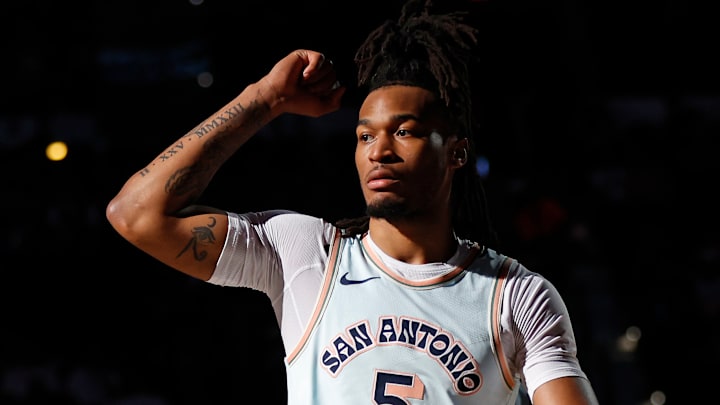"Growth isn't always linear." That is a sentence that should regularly stick in one's brain when evaluating young NBA players. Yes, some players seem to improve in straight-ahead fashion on a season-by-season basis, ultimately peaking in the middle of their careers after a steady ascent. For others, however, it isn't always that easy, both because of variance and perhaps because of injuries or team situations.
For the 2024 NBA Draft class, year two is approaching, and some players appear ready for full-fledged breakouts. At the same time, a handful of players could see some level of stagnation in their second season. This does not mean that the player will be definitively worse or that more growth isn't possible in the future, but rather, it is a potential warning that the more convenient ascent pattern may not be in the offing.
Here are four second-year players who may fit into that category for the 2025-26 season.
Dalton Knecht, Los Angeles Lakers
In the first two months of his rookie season, Dalton Knecht was one of the toasts of the town in Los Angeles. He was averaging 22.6 minutes per game and making 12 starts for the Lakers, performing solidly after he was chosen with a first round pick in 2024. Then, things leveled off considerably starting around the start of January, when Knecht averaged just 16.2 minutes per game and fell out of the rotation on multiple occasions before a 27-point outing on the final day of the regular season.
Overall, Knecht's shooting did shine at 38 percent from 3-point range, but he seems to enter his second NBA season with a smaller role than the one he occupied a year ago. For good measure, Knecht is already 24 years old, meaning he may not get the longer leash that some ultra-young prospects might.
Yves Missi, New Orleans Pelicans
Missi's potential leveling-off is more of a product of situation than his own play. The No. 21 pick in 2024 averaged 9.1 points and 8.2 rebounds per game as a rookie, showing encouraging flashes even while he was clearly raw in some areas. Missi was also able to play nearly 27 minutes per game over the entire season, in part due to an ugly center room for the Pelicans and an injury-plagued season for the franchise. This year, the Pelicans invested in Kevon Looney as a stabilizing force at the center position, and New Orleans also traded up for big man Derik Queen in June. Missi may be better on a per-minute basis in his second season, but that may not be noticeable to everyone if he's playing considerably less often.
Bub Carrington, Washington Wizards
In 2024-25, none of the top Rookie of the Year contenders led the class in playing time. Instead, that was Bub Carrington. The Wizards guard averaged 30.0 minutes per game and appeared in all 82 contests for Washington, easily lapping the field in overall deployment. The results were relatively rough, as one might expect for a rookie guard, and some advanced numbers rated Carrington as one of the cumulatively most damaging players in the league due to his baseline and how often he was on the court.
On the bright side, Carrington should not have to carry quite the same workload, particularly after the Wizards added CJ McCollum and drafted Tre Johnson in the lottery. At the same time, Carrington will likely play less, and the overall situation in Washington isn't too much better from a "winning games this season" standpoint. Carrington, like Missi, could be better on a per-game and per-possession basis, but his overall profile might take a hit.
Stephon Castle, San Antonio Spurs
Castle is the controversial inclusion on this list and, as noted above, this does not mean he will be worse than he was as a rookie. With that said, Castle was allowed to carry a massive workload for the Spurs, especially after Victor Wembanyama went down for the season. In Castle's final 36 games, he carried a star-level 28.9 percent usage rate, even as the Spurs were going 13-23 and he was performing at a strongly below average rate in overall efficiency. That push did allow Castle to lead all qualified rookies in scoring and earn Rookie of the Year honors, but his per-game stats soundly outpaced his actual effectiveness. After all, Castle finished with 52.2 percent true shooting for the season while ranking below the league average in ball security.
To be clear, Castle remains a very intriguing prospect and a talented player, but the situation is far more complicated in San Antonio. For one, the Spurs are clearly in more of a win-now mode. For another, the Spurs now have De'Aaron Fox and No. 2 overall pick Dylan Harper to take up quite a bit of usage, and Castle won't quite be the belle of the ball again as he was for part of last season.
